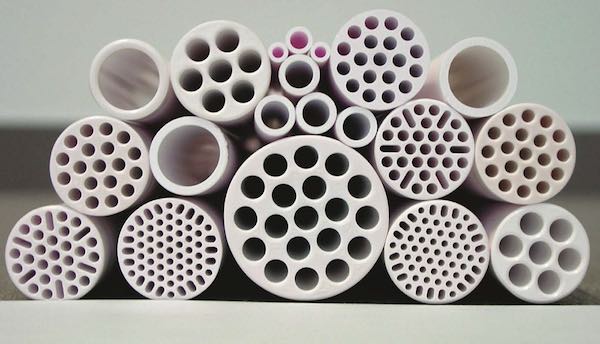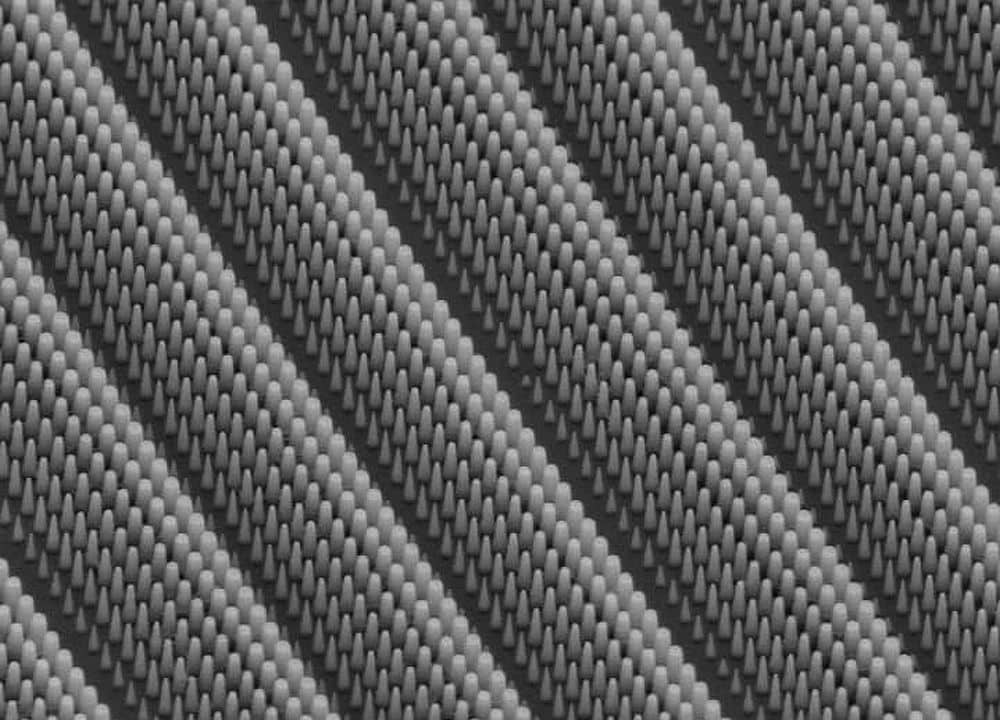
[Image above] Ceramic filtration membranes developed by the Fraunhofer Institute for Ceramic Technologies and Systems IKTS. Credit: Fraunhofer IKTS
Researchers at Fraunhofer Institute for Ceramic Technologies and Systems (IKTS) (Hermsdorf, Germany) have harnessed the power of ceramics to develop nanofiltration membanes that can generate completely clean drinking water from wastewater—even industrial sewage.
Fashioned into long white tubes that resemble fluorescent lightbulbs, the ceramic filters contain such tiny pores that pumping liquid through the tubes under pressure only allows water molecules to pass through the filter’s membrane, separating water from most all other dissolved molecules and contaminants. Completely clean water emerges on the outside of the tube.
But what’s really impressive about these filters is what you can’t see.
Consisting of several layers, the filters have an innermost layer made of an extremely fine ceramic nanofiltration membrane.
With pores that are <1 nm, these ceramic membranes can separate out molecules as small as 200 Daltons (a standard unit of mass equal to 200 g/mol)—even though experts previously thought that ceramic membranes had reached their possible filtration limit at 450 Daltons.
The challenge in developing such a limit-breaking membrane was being able to manufacture such incredibly tiny pores uniformly across an entire large membrane, completely sans defects.
By refining a sol gel technology, the IKTS scientists were able develop such a uniform fine ceramic membrane.
“Whereas only a few square centimeters of surface are usually coated, we equipped a pilot system with a membrane area of 234 m2, which means that our membrane is several magnitudes larger,” explains scientist Petra Puhlfuerss in an IKTS press release.
The IKTS video below puts the incredible size separation capabilities of these membranes into perspective—if the tubular ceramic filters had the diameter of earth, they could separate out out tennis balls.

Credit: Fraunhofer; YouTube
That’s such a fine filtering capability—and ceramics are such a heat and chemical resistant material—that the ceramic membranes can clean even industrial wastewater, sewage, and other contaminated water sources.
The filters can remove dissolved molecules in water, including antibiotics and hormones, which are not currently filtered out in traditional wastewater treatment processes. And according to the scientists, the filters can also remove heavy metals and herbicides from water, providing a completely advanced means of mechanical water purification.
Plus, the IKTS researchers’ development isn’t just a proof of principle—an industrial-scale filtration system commissioned by Shell has already been purifying wastewater from an oil sand extraction facility in Alberta, Canada, since 2016, according to the release.
Beyond industrial uses, however, such fine filters could enhance access to clean water around the world—and that’s something we can all drink to.
Author
April Gocha
CTT Categories
- Environment
- Manufacturing
- Material Innovations
- Nanomaterials
Related Posts
Sports-quality ice: From pond side to precision Olympic engineering
February 12, 2026


